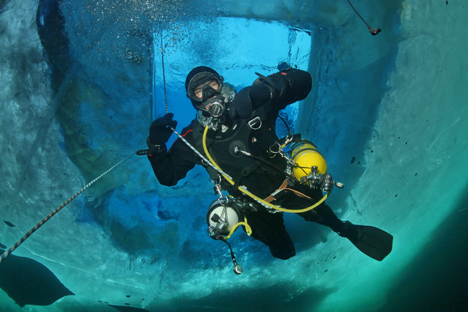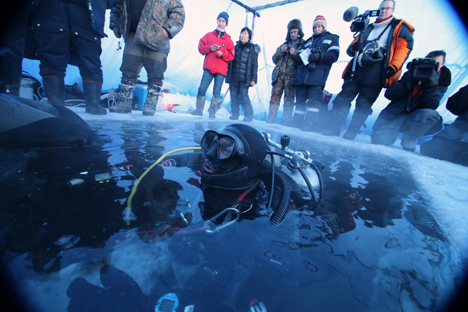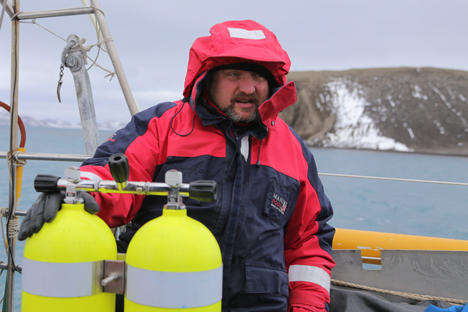
During the expedition divers will test new underwater equipment. Source: Press photo
The ‘Seas of Russia’ project will be launched by a group of scuba divers from Kazan (500 miles east of Moscow) who plan to dive to depths of over 100 meters in the Barents Sea in northwest Russia. These would be the deepest plunges ever attempted north of the Arctic Circle. Their dangerous mission will involve testing domestically produced new breathing equipment and examining the impact of such depths on the human body. They will also collect data on local marine wildlife at those depths where the temperature of water is approximately 0°C (32° F).
Among those participating in the expedition are Božana Ostojić, member of the World Underwater Federation Council and former associate of the renowned French explorer, Jacques Cousteau. Ostojić has been tasked with officially confirming the international record.
The divers will test new underwater equipment developed by the Russian holding company Termodinamika, a subsidiary of the Rostec state corporation. This equipment can be used at temperatures as low as -4°C (24.8°F), and has been tested in a lab at depths up to 300 meters, where water temperature was around -2°C (28.4°F), and on the ground with air temperatures of -19.5°C (-3.1°F). The equipment now needs to be tested in the natural environment to detect and eliminate possible defects.
The group of divers launching this ‘Seas of Russia’ programme consists of experienced divers who have explored the earth’s coldest waters, including those in Antarctica.
“Cold water diving involves additional risks like very low temperatures, unexpected currents, darkness and low visibility in deep waters, large animals, as well as the lack of necessary data,” said Alexander Gubin, an expedition member.
Examining sea animals to evaluate stress levels
During their dives, the group will observe and gather data on various marine species inhabiting the coastal waters. No scientist examining these sites has ventured deeper than 20 metres.
Earlier, for data collection, researchers preferred other methods, like using boats with special nets to collect benthic organisms, small animals and plants living on the seabed. These scuba divers would be able to gather more accurate data on local marine life.

During the plunge, the divers will collect data on the species inhabiting coastal waters. Source: Press photo
Specimens obtained by the divers will be handed over to Knipovich Polar Institute of Marine Fisheries and Oceanography in the city of Murmansk. “They will help us to find out more about the distribution of algae, mollusks, crustaceans and echinoderms - all the things living on the seabed,” Konstantin Sokolov, head of the Institute’s coastal research department, told RIR. “The divers will take photos and pass them on to us. They are not biologists, so they will only be able to make simple observations, but even that will be immensely useful to us.”
Yet another task is examining the physiological conditions of scuba divers in extreme depths. The high pressure of deep-water environments puts a strain on even the most experienced scuba divers. There is also the risk of so-called “nitrogen narcosis,” an alteration in behavior caused by various gases when diving at great depths, which usually manifests itself as panic or euphoria. Collecting scientific data will be one of the tests to assess the divers’ psychological state and perception.
A spiritual plunge
Apart from the research, the divers are also planning to install a memorial sign honoring dead sailors on the bottom of the Barents Sea. There is a spiritual idea behind the expedition as well. The divers will bring two relics: these will be the icon of Our Lady of Kazan, revered by the Russian Orthodox Church, and a Surah (chapter) of the Qur’an, Islam’s holy book. The two artifacts will serve as talismans of the expedition.
Additionally, the expedition divers have been appointed as the ambassadors of the World Aquatics Championships, which will be held in Kazan in 2015. They have been given a capsule filled with water that had previously been in space. The capsule will be brought to the bottom of the Barents Sea, and later will be used during the opening ceremony of the Championships.

Dmitry Shiller. Antarctida. Source: Press photo
The record-setting dive will commence a new project called “The Seas of Russia.” The divers’ goal is to set new records in all the seas surrounding the country. The project team will also film a series of documentaries and publish notes for researchers.
“We will be working without any support from the mainland,” says expedition leader Dmitry Shiller. If the Barents Sea dive is successful, the divers will attempt to set a record in the adjacent White Sea in 2016.
All rights reserved by Rossiyskaya Gazeta.
Subscribe
to our newsletter!
Get the week's best stories straight to your inbox